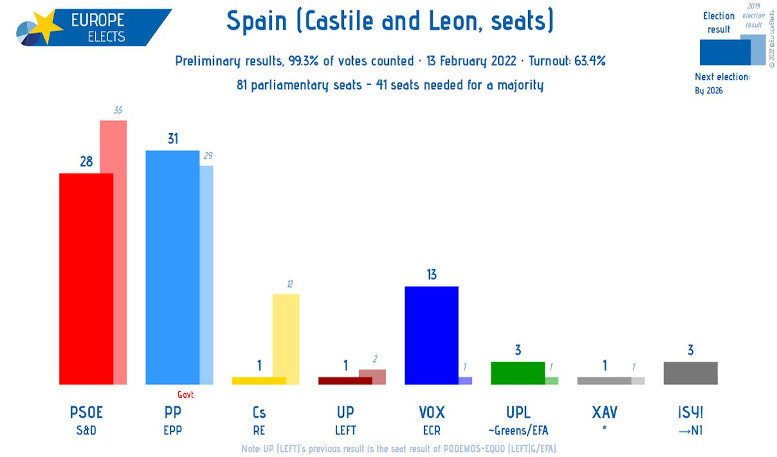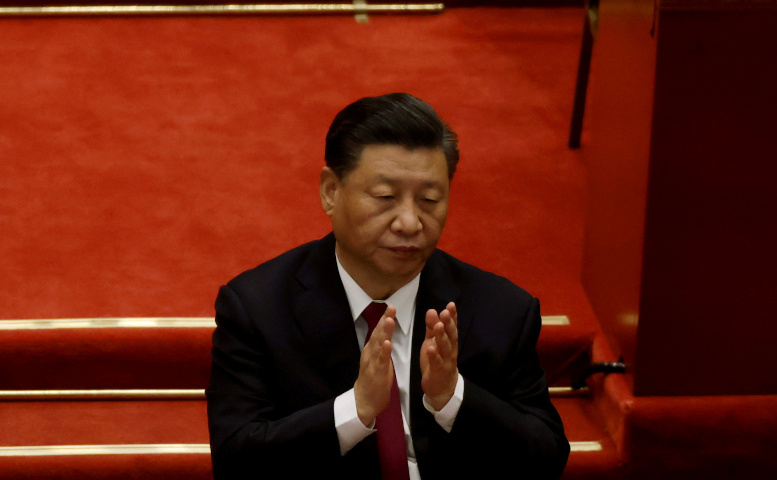John Hird is a member of Alternativa Socialista (ISA in the Spanish State).
The regional election results in Castilla and León are another clear warning to the left as the far-right VOX made the biggest gains for such a party in Europe since the start of the COVID19 pandemic.
The results are stark. The Socialist Party (PSOE) lost 115,621 votes, going from being the largest party in the 2019 elections with 34.8% of the votes in 2019, to only 30,05% share of the votes this time.
The right-wing People’s Party (PP) “won” the election with 378.896 votes and a 31.43% share. However, they got 53,736 votes less than in the 2019 election. This is a personal failure for PP leader Pablo Casado who banked everything on an outright victory, but now the PP can only govern with the support of the far-right Vox. Citizens (Ciudadanos) a right populist party, collapsed going from 12 seats to 1 and losing two thirds of its votes.
In 2019 in Castilla y León Vox received 75,331 votes (5.49 %) and one seat. Today they have 13 seats, with 212,605 votes (17.64%). In comparison, the left-wing Unidas Podemas then achieved 67,918 votes (4.95 %), but today just 61,290 votes (5.08%) and only one seat.
Another aspect of the election was the sudden growth of the regional party Soria ¡Ya! which won 3 seats in the regional parliament. The party proclaims itself independent of ideologies and campaigns as a movement against the neglect of rural Spain and lack of services. It is aligned with the platform España Vaciada (Empty Spain) which campaigns for investment into the depopulated and abandoned areas.
The election results will force the People’s Party (PP) to make a pact with the far-right, despite the fact that during the campaign it denied even considering this possibility. If there is no agreement, the community will be doomed to new elections. For the moment, VOX leader Abascal is demanding the vice-presidency.
The latest news is that Pedro Sánchez (Spanish leaders of PSOE) has offered to abstain in the vote to install the new government in the regional parliament if, the PP leader, Casado “asks for help to keep VOX out.” Meanwhile, the PP leader in Castilla y León wants to keep his options open and the populist PP leader of Madrid declares that the “left” cannot dictate which party the PP makes pacts with. Whatever the outcome of the backdoor and unprincipled negotiations, the fact remains the PP will depend on the ultra-right party’s votes.
Many on the left will be asking why is it that an openly far-right party is on the verge of joining the government in Castilla y León, given the deep social problems in the Spanish State?
As Alternativa Socialista explained previously this is part of the process of polarisation. To this can be added the disappointment of many workers and young people that a so-called “left” government of Spain by PSOE and Unidas Podemos has not taken measures to support the working class.
Before the previous general election PSOE and Unidas PODEMOS had declared they would reform the 2012 labour laws in favour of the working class. However, beyond the propaganda, what is certain is that the PSOE — Unidas PODEMOS coalition is failing to keep its promise, and is abandoning its commitment to completely repeal the labour laws first introduced by the Partido Popular (PP). Instead, they proposed changes, which simply legitimise and reinforce the central pillars of those laws which were then imposed by the governments of PSOE’s Jose Zapatero, and later the PP’s Mariano Rajoy.
The new law does not restore severance pay or lost wages when the courts decide a worker is unjustifiably sacked. Previously, companies had to put the unpaid salary aside from the moment a worker contested a dismissal. Neither does it restore, in the case of mass and collective redundancies the automatic use of EREs, which gave workers a guarantee of mediation and access to statutory redundancy pay. It also maintains flexibility for the bosses to make unilateral dismissals and it does not restore the priority of the sectoral agreement over the company agreement, except on the issue of wages.
As recognised by Aznar (ex leader of the PP) and the president of the CEOE employers’ association, Antonio Garamendi, this new agreement does not touch the basic pillars of the previous reforms, and therefore cannot in any way be considered a step forward.
The “not really a reform” reform does nothing for millions of workers on low wages and in precarious jobs. In fact, the coalition, despite fine words, gives no impression they are on the side of the working class. It was this government which allowed the national police to use tanquetas (armored cars) in the working-class neighbourhoods of Cádiz in an attempt to crush the magnificent strike of metal workers at the end of last year in the city.
It is no surprise that there is a lack of enthusiasm for the PSOE -Unidas PODEMOS government. In Castilla — León participation turnout dropped 7.6% from 2019 to 63.4%.
A snapshot of the election shows:
- PSOE (“Socialist” party): down116,616 votes
- PP (conservative party): down 54,768 votes
- UP (Podemos, left party): down 6,777 votes
- VOX (far-right party): up 136,487 votes
This should be taken as another warning to the left to seriously start discussing how to stop the rise of the far-right.
The ongoing setbacks of Unidas PODEMOS should not be taken as evidence that left ideas are unpopular. VOX have gained in Castilla y León precisely because the left is NOT offering a clear working class alternative. PODEMOS have been tainted by their involvement in the PSOE coalition. They should have been criticising PSOE from the left in parliament and importantly on the streets.
As Alternativa Socialista said at the time of the regional elections in Madrid:
“During the last year, workers have put their lives at risk and kept the economy and society going, yet there have been almost no authentic voices in parliament articulating the needs and aspirations of the working class. No voices raised against the banks, multinationals and big companies profiteering in the pandemic and sacking workers. Despite the PSOE-UP coalition there has been no discussion of a socialist programme in parliament to get us out of this mess.”
Now, if, which is possible, VOX form part of the government in Castilla y León, the political situation will further polarise. Their misogynistic, homophobic, racist and anti-independence hate speech will further radicalise women, young people, and workers. It will exacerbate the national question in Euskal Herria (Basque Country) and Catalunya.
Women, the young and working-class people have their opportunity to give their answer to the rise of VOX on international women’s day on March 8th!



